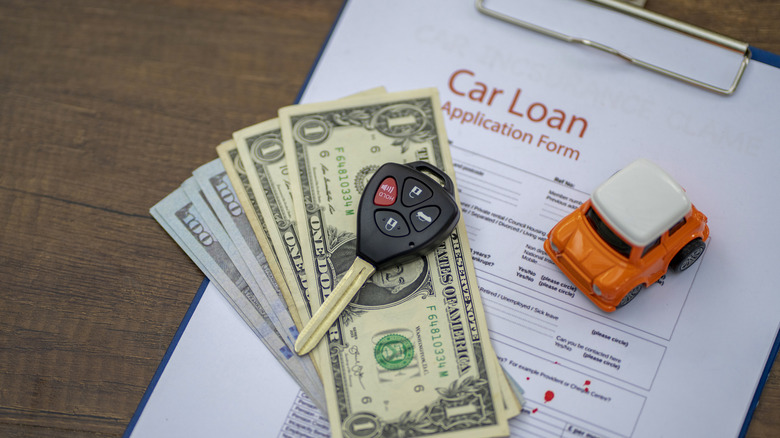An Alarming Number Of Americans Are Now Paying $1,000+ Per Month For Their Cars
Everywhere you look, prices seem to be going up. From food prices, which went up a whopping 23.6% from 2020 to 2024, according to the U.S. Department of Agriculture's Economic Research Service, to housing prices, which increased 47% during the same time period, per NPR, consumers are stretched thinner than ever. When basic necessities become harder and harder to afford, it can be difficult for many to prioritize other needs, like transportation. In fact, given the prolonged high interest rates from the Federal Reserve, along with the possibility of Trump's tariffs affecting car prices for consumers, it has not been a good time to buy a new car in quite a while.
However, as consumers who have been holding out on buying a new car — either in the hopes that interest rates would come down, or that car prices might normalize post-pandemic — now come up on several years of that deferred purchase, many are being forced to finally bite the bullet. This is especially true in cities and states where cars are the primary mode of transportation, and public transportation infrastructure is nonexistent. Whether it's a used family car, or a new work truck needed for specialty projects, car buyers are, unfortunately, facing higher prices than ever. This has pushed more consumers into astronomical monthly car payments. In fact, according to Edmunds' Q2 2025 data, a record-breaking 19.3% –- or 1 in 5 -– new-car buyers committed to monthly payments of at least $1,000 in Q2 2025.
Breaking down car buyer financing
For starters, car loans, like everything else, are going up. Edmunds found that the average amount that was financed for new vehicles in Q2 2025 was $42,388 -– an all-time high. This leaves consumers with larger levels of debt, which affects other elements of their finances. The total auto loan balance for consumers in the U.S. was $1.64 trillion as of Q1 2025, according to the Federal Reserve Bank of New York's Center for Microeconomic Data. Plus, it's worth mentioning that delinquency rates on debt rose when compared to Q4 2024 — with 4.3% of all outstanding debt in some stage of delinquency.
The higher cost of new vehicles is also leaving consumers unable to put as much down on a vehicle as they might have in the past. In fact, Edmunds found that the average down payment for new-car purchases in Q2 2025 was just $6,433, a decline compared to the previous two quarters. As Ivan Drury, Edmunds' director of insights, explained, "It's clear that buyers are pulling the few levers they can control to manage affordability, whether that's by taking on longer loans, financing more, or putting less money down — even if some of those decisions increase their total costs." This situation isn't helped by the fact that interest rates on car loans remain high. This not only leaves consumers paying more but also means there are fewer 0% finance deals being offered by dealerships than ever before. In fact, the rate of 0% finance deals offered in Q2 2025 fell to just 0.9% of all new-vehicle loans — the lowest rate Edmunds has on record since 2004.
Understanding loan terms
Another massive reason for the overall higher total costs of buying a car has to do with the fact that more and more would-be car buyers are being drawn to longer loan terms when financing their vehicle. While these longer loan terms can lower the monthly payments, it can also come with many more unintended financial consequences. As Joseph Yoon, Edmunds' consumer insights analyst, explained in Edmunds' trend report, "While extended loan terms may make a monthly payment more palatable, consumers need to keep in mind the risks associated with a loan extended that far into the future, including increased costs for upkeep down the line and the risk of being underwater on the loan if the car is traded in before it's paid off."
To make matters even worse, when factoring in how quickly a car can depreciate, many owners with extended loan terms can end up owing more than their car is even worth. In fact, a Q3 2024 survey from CarEdge found that 31% of those with car financing were underwater on those car loans. The Edmunds trend report found that, in Q2 2025, 22.4% of all new-vehicle financing was for loans with terms of at least 84 months –- a new record. Plus, this was a noticeable increase from the same quarter the year before in which just 17.6% of new-vehicle financing was for extended loan terms. These extended terms leave consumers paying even more for the same already expensive vehicle. Instead, Yoon recommends, "If payments on a more standard 60- or 72-month loan don't fit your budget, you might consider leasing."


